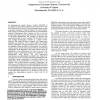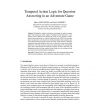49 search results - page 3 / 10 » Memory analysis and significance test for agent behaviours |
GECCO
2007
Springer
13 years 7 months ago
2007
Springer
In autonomous agent systems, memory is an important element to handle agent behaviors appropriately. We present the analysis of memory requirements for robotic tasks including wal...
PLDI
1994
ACM
13 years 9 months ago
1994
ACM
As microprocessor speeds increase, memory bandwidth is increasing y the performance bottleneck for microprocessors. This has occurred because innovation and technological improvem...
POPL
2009
ACM
14 years 6 months ago
2009
ACM
Multiprocessors are now dominant, but real multiprocessors do not provide the sequentially consistent memory that is assumed by most work on semantics and verification. Instead, t...
SEKE
2007
Springer
13 years 11 months ago
2007
Springer
— We present a statistical approach for software agents to learn ontology concepts from peer agents by asking them whether they can reach consensus on significant differences bet...
AGI
2008
13 years 7 months ago
2008
Inhabiting the complex and dynamic environments of modern computer games with autonomous agents capable of intelligent timely behaviour is a significant research challenge. We illu...


